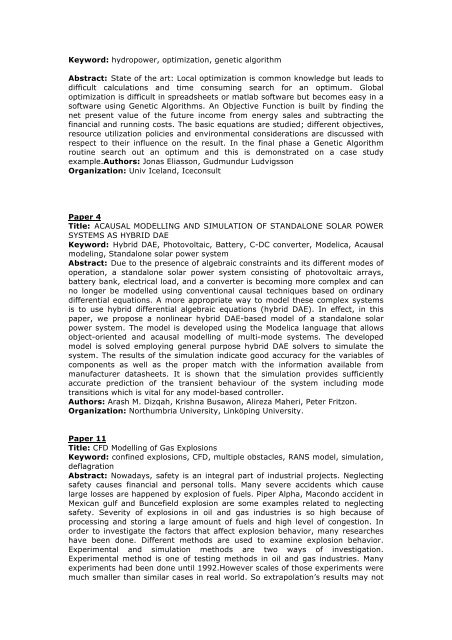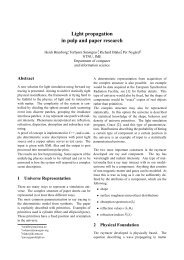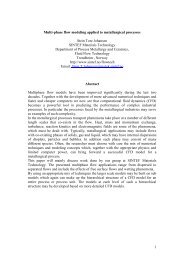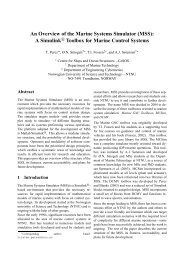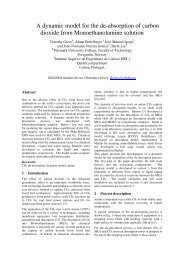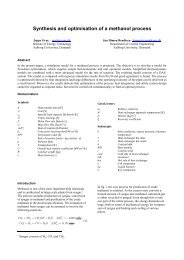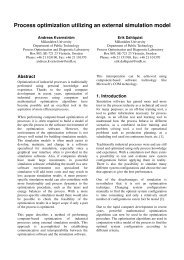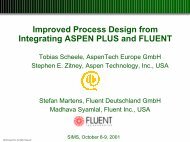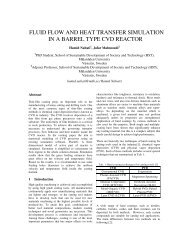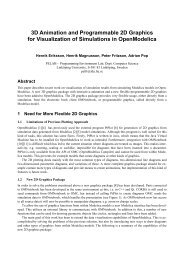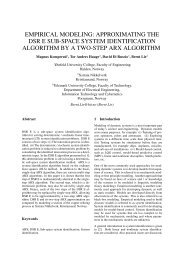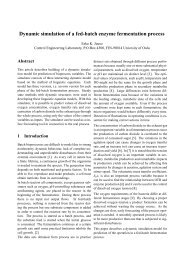detailed programme - SIMS - Scandinavian Simulation Society
detailed programme - SIMS - Scandinavian Simulation Society
detailed programme - SIMS - Scandinavian Simulation Society
Create successful ePaper yourself
Turn your PDF publications into a flip-book with our unique Google optimized e-Paper software.
Keyword: hydropower, optimization, genetic algorithm<br />
Abstract: State of the art: Local optimization is common knowledge but leads to<br />
difficult calculations and time consuming search for an optimum. Global<br />
optimization is difficult in spreadsheets or matlab software but becomes easy in a<br />
software using Genetic Algorithms. An Objective Function is built by finding the<br />
net present value of the future income from energy sales and subtracting the<br />
financial and running costs. The basic equations are studied; different objectives,<br />
resource utilization policies and environmental considerations are discussed with<br />
respect to their influence on the result. In the final phase a Genetic Algorithm<br />
routine search out an optimum and this is demonstrated on a case study<br />
example.Authors: Jonas Eliasson, Gudmundur Ludvigsson<br />
Organization: Univ Iceland, Iceconsult<br />
Paper 4<br />
Title: ACAUSAL MODELLING AND SIMULATION OF STANDALONE SOLAR POWER<br />
SYSTEMS AS HYBRID DAE<br />
Keyword: Hybrid DAE, Photovoltaic, Battery, C-DC converter, Modelica, Acausal<br />
modeling, Standalone solar power system<br />
Abstract: Due to the presence of algebraic constraints and its different modes of<br />
operation, a standalone solar power system consisting of photovoltaic arrays,<br />
battery bank, electrical load, and a converter is becoming more complex and can<br />
no longer be modelled using conventional causal techniques based on ordinary<br />
differential equations. A more appropriate way to model these complex systems<br />
is to use hybrid differential algebraic equations (hybrid DAE). In effect, in this<br />
paper, we propose a nonlinear hybrid DAE-based model of a standalone solar<br />
power system. The model is developed using the Modelica language that allows<br />
object-oriented and acausal modelling of multi-mode systems. The developed<br />
model is solved employing general purpose hybrid DAE solvers to simulate the<br />
system. The results of the simulation indicate good accuracy for the variables of<br />
components as well as the proper match with the information available from<br />
manufacturer datasheets. It is shown that the simulation provides sufficiently<br />
accurate prediction of the transient behaviour of the system including mode<br />
transitions which is vital for any model-based controller.<br />
Authors: Arash M. Dizqah, Krishna Busawon, Alireza Maheri, Peter Fritzon.<br />
Organization: Northumbria University, Linköping University.<br />
Paper 11<br />
Title: CFD Modelling of Gas Explosions<br />
Keyword: confined explosions, CFD, multiple obstacles, RANS model, simulation,<br />
deflagration<br />
Abstract: Nowadays, safety is an integral part of industrial projects. Neglecting<br />
safety causes financial and personal tolls. Many severe accidents which cause<br />
large losses are happened by explosion of fuels. Piper Alpha, Macondo accident in<br />
Mexican gulf and Buncefield explosion are some examples related to neglecting<br />
safety. Severity of explosions in oil and gas industries is so high because of<br />
processing and storing a large amount of fuels and high level of congestion. In<br />
order to investigate the factors that affect explosion behavior, many researches<br />
have been done. Different methods are used to examine explosion behavior.<br />
Experimental and simulation methods are two ways of investigation.<br />
Experimental method is one of testing methods in oil and gas industries. Many<br />
experiments had been done until 1992.However scales of those experiments were<br />
much smaller than similar cases in real world. So extrapolation’s results may not


